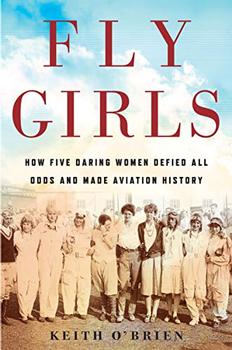Summary | Excerpt | Reading Guide | Discuss | Reviews | Readalikes | Genres & Themes | Author Bio

How Five Daring Women Defied All Odds and Made Aviation History
by Keith O'BrienThe Miracle of Witchita
The coal peddlers west of town, on the banks of the Arkansas River, took note of the new saleswoman from the moment she appeared outside the plate-glass window. It was hard not to notice Louise McPhetridge.
She was young, tall, and slender, with distinct features that made her memorable if not beautiful. She had a tangle of brown hair, high cheekbones, deep blue eyes, thin lips programmed to smirk, and surprising height for a woman. At five foot eight and a quarter inches?- she took pride in that quarter inch?- McPhetridge was usually the tallest woman in the room and sometimes taller than the cowboys, drifters, cattlemen, and businessmen she passed on the sidewalks of Wichita, Kansas.
But it wasn't just how she looked that made her remarkable to the men selling coal near the river; it was the way she talked. McPhetridge was educated. She'd had a couple years of college and spoke with perfect grammar. Perhaps more notable, she had a warm Southern accent, a hint that she wasn't from around Wichita. She was born in Arkansas, two hundred and fifty miles east, raised in tiny Bentonville, and different from most women in at least one other way: Louise was boyish. That's how her mother put it. Her daughter, she told others, "was a follower of boyish pursuits"?- and that wasn't meant as a compliment. It was, for the McPhetridges, cruel irony.
Louise's parents, Roy and Edna, had wanted a boy from the beginning. They prayed on it, making clear their desires before the Lord, and they believed their faith would be rewarded. "Somehow," her mother said, "we were sure our prayers would be answered." The McPhetridges had even chosen a boy's name for the baby. And then they got Louise.
Edna could doll her daughter up in white dresses as much as she wanted; Louise would inevitably find a way to slip into pants or overalls and scramble outside to get dirty. She rounded up stray dogs. She tinkered with the engine of her father's car, and sometimes she joined him on his trips selling Mentholatum products across the plains and rural South, work that had finally landed the McPhetridges here in Wichita in the summer of 1925 and placed Louise outside the coal company near the river.
It was a hard time to be a woman looking for work, with men doing almost all the hiring and setting all the standards. Even for menial jobs, like selling toiletries or cleaning houses, employers in Wichita advertised that they wanted "attractive girls" with pleasing personalities and good complexions. "Write, stating age, height, weight and where last employed." The man who owned the coal company had different standards, however. Jack Turner had come from England around the turn of the century with nothing but a change of clothes and seven dollars in his pocket. He quickly lost the money. But Turner, bookish and bespectacled in round glasses, made it back over time by investing in horses and real estate and the city he came to love. "Wichita," he said, "is destined to become a metropolis of the plains."
By 1925, people went to him for just about everything: hay, alfalfa, bricks, stove wood, and advice. While others were still debating the worth of female employees, Turner argued as early as 1922 that workers should be paid what they were worth, no matter their gender. He predicted a future where men and women would be paid equally, based on skill?- where they would demand such a thing, in fact. And with his worldly experience, Turner weighed in on everything from war to politics. But he was known, most of all, for coal. "Everything in Coal," his advertisements declared. In winter, when the stiff prairie winds howled across the barren landscape, the people of Wichita came to Turner for coal. In summer, they did too. It was never too early to begin stockpiling that vital fuel, he argued. "Coal Is Scarce," Turner told customers in his ads. "Fill Your Coal Bin Now."
Excerpted from Fly Girls by Tim O'Brien. Copyright © 2018 by Tim O'Brien. Excerpted by permission of Eamon Dolan/Houghton Mifflin Harcourt. All rights reserved. No part of this excerpt may be reproduced or reprinted without permission in writing from the publisher.
When an old man dies, a library burns to the ground.
Click Here to find out who said this, as well as discovering other famous literary quotes!
Your guide toexceptional books
BookBrowse seeks out and recommends the best in contemporary fiction and nonfiction—books that not only engage and entertain but also deepen our understanding of ourselves and the world around us.